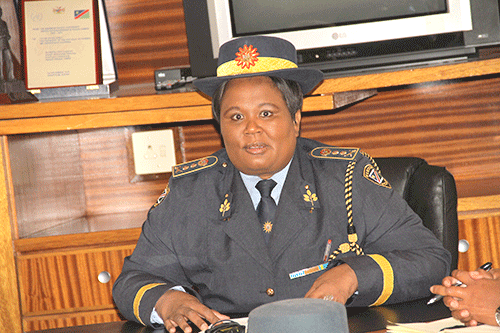Rudolf Gaiseb
In strides to fight crime and promote public safety, the Namibian Police launched a Criminal Intelligence Analytical Unit in Windhoek recently.
The unit will foster proactive crime prevention, ensure strategic resource deployment and enhance capacity for informed decision-making.
Deputy Inspector General for Administration, Anne-Marie Nainda, highlighted that the policing landscape is volatile, and criminal networks operate across borders and leverage technology to evade law-enforcement efforts.
“It is, therefore, imperative that our strategies evolve to stay ahead of the current and emerging threats. The establishment of the Crime Intelligence Analytical Unit is a strategic response to this challenge and is aimed at enhancing our ability to analyse crime patterns, predict trends and develop targeted interventions to prevent, reduce, detect, interrupt and solve crime,” she said.
The unit will also provide valuable insights for strategic planning and policy-making, helping the police to develop long-term strategies for impactful policing.
Twenty officers were trained in crime intelligence analysis from 24 to 28 February at the police national headquarters.
Six of the 20 officers were selected for the unit to provide the required services.
The innovative approach is a result of the support of the European Union project in Africa, Enhancing Africa’s Response to Transnational Organised Crime (Enact).
The Enact project is implemented by the Institute for Security Studies (ISS), in partnership with the International Criminal Police Organisation (Interpol) and the Global Initiative Against Transnational Organised Crime (GI-TOC).
Enact works to mitigate the impact of transnational organised crime (TOC) in Africa on development, governance, security and the rule of law.
Enact project manager Nathalie Richard Bober said criminal intelligence analysis is an essential component of effective policing at both operational and strategic levels and that enhanced criminal intelligence analysis is a key tool in responding to organised crime, as it informs law enforcement agencies about evolving trends, emerging crimes and criminal network behaviour.
She said Interpol’s strength in setting up analysis units lies in an integrated, turnkey approach that comprises the initial training of the police officers making up the unit.
“Crucially important is an active mentoring programme that extends throughout the project, enabling the units to be effectively monitored over an extended period and to grow gradually,” she said.
She said Namibia has demonstrated a strong political commitment to establishing this analytical unit, affirming that the country has procured all the necessary equipment and software independently.
“The unit has a direct connection to Interpol databases, enhancing its capabilities. The Enact team has been involved in the selection of the analysts, provided initial training, and will continue to mentor the unit until January 2026, marking the end of the project.
This unit is expected to be a significant asset in Namibia’s fight against organised crime,” she said.
EU representative Ian Dupont said the opening of the national analytical units, coupled with long-term mentoring from Interpol, will assist national police forces in adopting proactive strategies to combat organised crime.
Enact will support Namibia in addressing and providing viable data on the impact of transnational organised crime so that Namibia can address the associated threats effectively.
“Already, Enact has supported nine criminal analytical units that deliver concrete results, such as Côte d’Ivoire, Congo, Togo, Nigeria, Gabon, Uganda, Malawi, Tanzania; now Namibia, and hopefully next week Senegal. So, Namibia is in good company,” he said.



